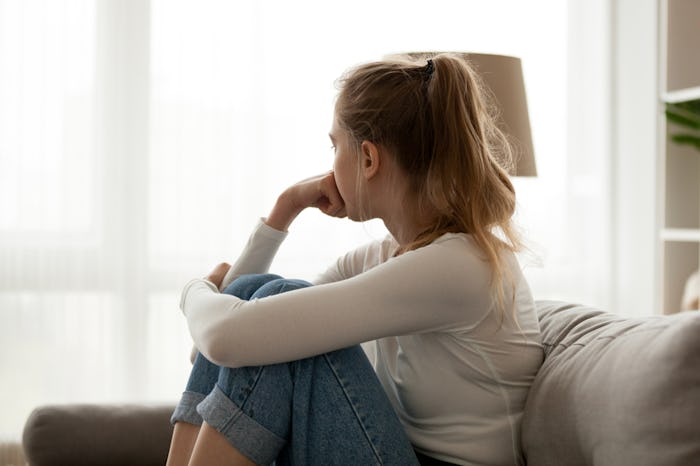Life

9 Signs Your Marriage Will Survive Postpartum Depression
Becoming a parent is a huge adjustment in and of itself, but a diagnoses of postpartum depression (PPD) on top of this huge life change takes a toll on more than just happiness. As moms struggle to keep their daily life afloat and care for their baby, their relationships may become strained, especially their marriage. When you have PPD, it may feel like you have no more energy to put into strengthening your marriage, but if you and your partner want to recover together, focus on the signs your marriage will survive postpartum depression. Because these are the things that will help you make it to the other side.
To understand the important role a spouse or partner plays in PPD recovery, I spoke with Robyn Alagona Cutler, a marriage and family therapist specializing in maternal mental health. "Spouses are one of the first to recognize that mom is struggling, when they do, they need to assist her in getting the help that she needs," Cutler said. Adding to this idea is research which shows "that if couples learn to tend to the relationship with effective tools, this could conceivably relieve depression or likely protect from relapse," according to Psychology Today. Which is good news for those couples who believe they can weather the storm together.
It's possible that some signs your marriage will survive postpartum depression are already there, but in case you aren't sure, this list will point you in the right direction.
1Your Partner Doesn't Blame You
Postpartum depression is no one's fault, and the mother should never be to blame for what she is experiencing. As Pregnancy Weekly pointed out, a supportive partner never blames the mother for having PPD, but instead continues to remind her that it's not her fault.
2Your Partner Gives You Breaks
When you have postpartum depression, symptoms are made worse by fatigue, as the website for Postpartum Support International reported. If you have a partner that encourages you to take time for yourself, it's a good sign that your marriage has what it takes to make it through this phase.
3Your Partner Is Informed
It takes two people in a relationship to make things work — and this is certainly the truth for PPD. As What To Expect's website pointed out, partners should educate themselves on postpartum depression so they know how to best support the mother. Understanding the condition can give your partner insight into their role in recovery.
4Your Partner Provides Support
Everyone needs and seeks help in different ways, so a spouse that is consistently supportive helps to make the marriage stronger. "Research has shown us that a woman's depression will improve markedly with the consistent support of a significant other," according to Psychology Today.
5Your Partner Keeps Trying
One struggle of postpartum depression is the changing of your wants and needs. Each day can be be so different from the next. A committed partner keeps trying and communicating about your needs during PPD, as The Center For Postpartum Depression pointed out.
6You Are Seeking Professional Help
Living with postpartum depression is not a road you have to walk alone, help is available. As the website for The Postpartum Stress Center pointed out, getting treatment for PPD can be crucial for a successful recovery. Some mothers do this one-on-one with a therapist, while others include their SO and see a counselor as a couple.
7Your Partner Steps Up
Recovery from PPD is different for each woman, and while you're focusing on healing, you're partner can take on some extra responsibility. Helping with chores, running errands, and giving you some alone time shows that you're partner is invested in your recovery from postpartum depression, according to Pregnancy Weekly.
8Your Partner Doesn't Judge You
When you have postpartum depression, you could be feelings ways and having thoughts you never experienced before. A partner who can listen without judgement when you express your thoughts shows that they are committed to helping your through PPD, according to Postpartum Support International's website.
9You Have Support
Even if your spouse is trying their best to help you through PPD, it may be the time away from them that actually helps strengthen your marriage. That's because sometimes you need the support of others who have been through this before, and are dealing with it along side you. Join a support group in your area, or an online support community for PPD to connect with others sharing your struggle.